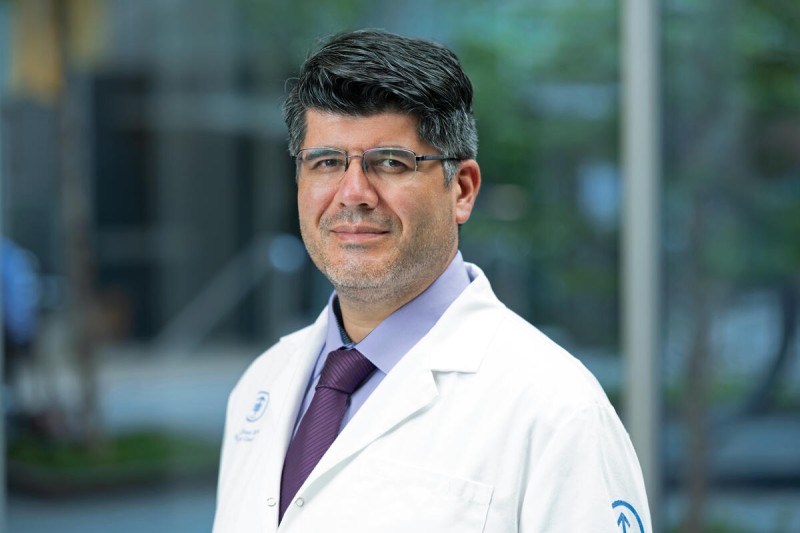
There have been conflicting studies on whether phosphodiesterase type 5 (PDE5) inhibitors, such as sildenafil or tadalafil, are associated with an increased risk of biochemical recurrence after radical prostatectomy for prostate cancer.
A new study by investigators at Memorial Sloan Kettering Cancer Center (MSK) found no evidence of an increased risk of biochemical recurrence with any PDE5 inhibitor use or duration in the first year following radical prostatectomy. The study, published recently in The Journal of Urology, (1) lends considerable weight to evidence demonstrating that PDE5 inhibitors are safe for this patient population.
“Given the high volume of patients who undergo radical prostatectomy for prostate cancer at MSK, we were in an excellent position to study our institutional experience to shed light on any potential risk relationship,” said urologic surgeon Jose Flores, MD, MHA, lead author of the study. “Our findings indicate that prescribing PDE5 inhibitors to these patients should be based entirely on maximizing erection recovery after surgery. We can also reassure patients taking these medications that their risk of biochemical recurrence due to these medications is exceedingly low.”
Dr. Flores is a member of MSK’s Male Sexual and Reproductive Medicine Program, a specialized service entirely dedicated to caring for men who experience sexual difficulties or fertility problems as a result of their cancer or cancer treatment. The team includes collaborating urologic surgeons, nurse practitioners, and mental health professionals. Urologic surgeon John Mulhall, MD, the study’s senior author, is the program’s director.
Erectile Dysfunction After Radical Prostatectomy
Erectile dysfunction is a frequent postoperative complication experienced by patients after undergoing radical prostatectomy for prostate cancer. PDE5 inhibitors are typically used as a first-line therapy and as a rehabilitation strategy. Many studies have found these medications are safe and effective for these indications. (2) (3)
Conflicting Evidence on Risk of Biochemical Recurrence
A single-center retrospective study published in 2015 by investigators in Germany reported an increased rate of biochemical recurrence for patients who took PDE5 inhibitors after radical prostatectomy for prostate cancer compared to the non-PDE5 group. The study reported a five-year biochemical recurrence-free survival rate of 84.7% for 1,110 patients in the PDE5 group compared to 89.2% for 3,642 patients in the non-PDE5 group. (4)
The study had some notable drawbacks, including not quantifying PDE5 inhibitor exposure and not using a landmark analysis to account for the fact that using these drugs can only be entirely determined 12 months after surgery given that the quantity and duration vary among patients. (4)
Several subsequent studies have reported no significant differences in recurrence-free survival. (5) (6) (7) (8) (9) Further, a recent study led by researchers at Rush University Medical Center in Chicago found using PDE5 inhibitors was associated with a more favorable biochemical recurrence-free survival and overall survival rate: The biochemical resistance-free survival rate up to 10 years after surgery was 93% versus 85% for patients who took PDE5 inhibitors versus nonusers, and PDE5 inhibitor exposure was a protective factor for biochemical recurrence-free survival. (10)
MSK Study Design
Since 2002, MSK has offered PDE5 inhibitors to patients after radical prostatectomy to take daily during the first year after surgery. All patients receive a 12-month prescription with refills. MSK maintains a serial, self-reported patient database on medication usage.
The MSK investigators reviewed data records for 4,630 patients with prostate cancer treated between January 2009 and December 2020. They defined biochemical recurrence as two PSA measurements greater than 0.1 ng/mL. PDE5 inhibitor use was defined on a scale of 0 to 3, where 0 represented never used; 1 for used sometimes, such as once weekly; 2 for regular use, defined as once or twice weekly; and 3 for routine use, which included daily, nearly every day and more than once daily.
The researchers evaluated the risk of biochemical recurrence with any PDE5 inhibitor exposure, the quantity of medication, and exposure duration. They also performed sensitivity analyses to check for evidence of an association after changing different variables, including a longer period of 24 months post-surgery, combining “sometimes/less than once a month” with “no use,” and adding age and nerve-sparing status. (1)
MSK Study Findings
Among 4,630 patients, 4,137 or 89% reported taking a PDE5 inhibitor at any time during the first year after radical prostatectomy, and 60% reported taking the medication for six or more months during the same period. A total of 776 patients (17%) had a biochemical recurrence. (1)
Dr. Flores and colleagues found no evidence of an association between PDE5 inhibitors and an increased risk of biochemical recurrence in the primary analysis or any of the sensitivity analyses. (1)
“We hope our findings will reassure patients and urologic surgeons alike that PDE5 inhibitor therapy after radical prostatectomy is safe and effective for treating erectile dysfunction and maximizing erectile function recovery after radical prostatectomy for prostate cancer,” Dr. Flores said. “At MSK, we remain dedicated to helping our patients understand the potential for treatment-related sexual dysfunction and help them optimize their recovery based on personal preferences.”
Learn more about MSK clinical trials for patients with prostate cancer. Read how MSK’s Motion Management Platform for Radiotherapy Reduces Late Urinary Toxicity in Prostate Cancer.
The study was supported by funding from the National Institutes of Health/National Cancer Institute (grant P30-CA008748) and SPORE Grant in Prostate Cancer (P50-CA92629), the Patient-Centered Outcomes Research Institute (ME- 2018C2-13253), the Sidney Kimmel Center for Prostate and Urologic Cancers, and David H. Koch through the Prostate Cancer Foundation. All authors reported no conflicts of interest. Note that senior study author Dr. John Mulhall is a member of The Journal of Urology’s editorial board and was recused from the editorial and peer review processes.